A 2000-word essay reflecting on an uncle who died in 1930 while an infant.
I grew up in Marshall, Missouri, a small rural town of 13,000 people, & lived there until I was 17, when I left for St. Louis to attend college. My mom & dad were divorced, so my brother & I lived mostly with our mom Betty Sue, but we saw our dad Ralph all the time. My dad’s parents died when I was young, so I barely remember them. My mom was an only child, but she was close to her parents, which meant that my brother & I had the rare privilege of living only a few blocks from my maternal grandparents, Edgar & Ruth Scott. As a result, I visited with them at least every other day during my time in Marshall.
One of the things they taught me was the importance of family history, of those who had come before us & made us the people we are now. I learned about my great-great-grandfather & his brother, who as boys played the fife and drums respectively during the Civil War to lead their fellow Northerners into battle. Every time he told that story, Grandpa would disappear into another room of his house, to return a moment later with his great-grandfather’s fife. I learned about Charles Scott, the first of that line to emigrate to America from Scotland by crossing the Atlantic some time in the early 1800s. If I asked, Grandpa would show me the wooden chest Charles Scott had brought with him which had carried all his possessions in the world, & with his name still carved by his own hand in the bottom. Grandpa showed me pictures of those that had come before, & Grandma told us funny stories about people who died before my time, & we learned the family names that had been passed down from generation to generation: surnames like Cromley & Fitzsimmons & Puntenney & Trigg, and forenames of Walter & Charles & Theodocia & Stephen.
One thing they had never talked much about was their first child, who was dead before he was three weeks old.
Charles Marion Scott was born on October 21, 1930, & died suddenly on November 7. It wasn’t that his death was a dark family secret. It was more that he just never came up, & I never thought to ask. I just assumed my mother was an only child, & that was that. It wasn’t until I was a teenager that I found out about him.
I don’t remember how he came up, but I can recall how my Grandpa told me, with a touch of sadness in his voice even after 50 years had passed, about the “little fella” & how he had died without warning, & for no reason that they could see. And I still remember how shocked I was when I found out about this person that had always been a part of my family, yet at the same time had been invisible to me, like a ghost that only others could see.
My mother wasn’t an only child. She’d had an older brother that was five years her elder, who she had never gotten a chance to know. I had an uncle, or rather, I would have had an uncle, a dynamic that would have completely changed our small family. And my grandparents would have had a son … I mean, my grandparents had a son, for a brief time, but instead, they would’ve had a son that lived to become a boy, & then a young man, & then a man. But he died before any of that came to be.
I thought often about Charles Marion Scott, & over time, I grew to miss my phantom uncle. I would ask myself questions about him, & imagine him as a person I knew. What would he have looked like? What kind of job would he have? Would he have taken after his father & been a talented hobbyist handyman? What kind of smile would his mother have on her face when he said something funny during a family dinner? Would he have stayed in Marshall? Would my brother & I have seen him often, & enjoyed talking with him? Questions without answers, but questions I pondered nonetheless.
My grandparents were always willing to tell us about him if we asked, but they didn’t have any mementos of his brief time among us. There were no pictures of Charles Marion, as photography back in 1930 in a small rural town wasn’t something that was readily available to people of very modest means, like my grandparents were. And you certainly wouldn’t have photographed an infant — what extravagance!
There were no objects that had once been his, like baby blankets or baby shoes or toys. Those had long ago been thrown, or, more likely, given away. And there were no paper records of him in my grandparents’ home, either. The only thing left to show that Charles Marion Scott had once lived were the memories of two people who had been his parents for a too-brief period of time.
The only thing left to show that Charles Marion Scott had once lived were the memories of two people who had been his parents for a too-brief period of time.
Grandpa died in 1994, & then, after Grandma died in 2000, I was the one that went through their house to put aside the junk to throw out, mark the items we could sell, & identify the family-related artifacts to keep. It took years to get through all the papers I saved, & some time after Grandma died, I came across something unexpected: a few remnants of Charles Marion Scott’s existence.
It turned out that Grandpa & Grandma had saved articles from The Democrat News, Marshall’s small-town newspaper, about their son’s death. There they were, yellowed & fragile, the words still readable & still painful, perhaps more so due to the detached tone adopted by newspapers that must report news that cuts someone to the bone.
He had been critically ill only a very short time and his passing came as a shock to the parents.
There’s a lifetime of hurt there between “only a very short time” and “a shock to the parents”.
A year or so later, I was researching some relatives for inclusion in my family tree when I discovered that you could look up death certificates online. After looking up several people, including my dad (dead in 1997), Charles Marion came to mind. I entered the relevant information, click Search, & there it was.
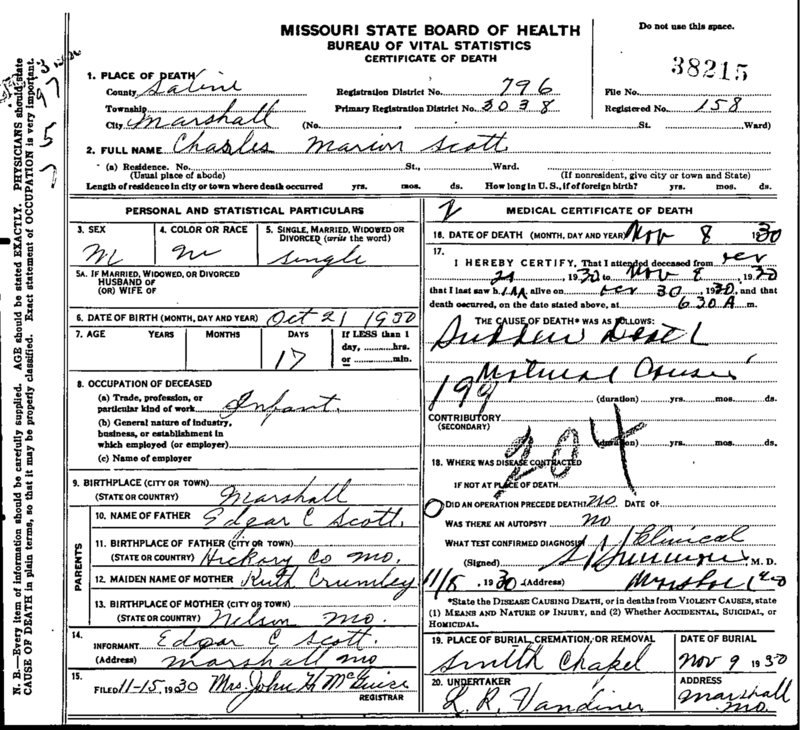
Charles Marion Scott’s death certificate
17 days old. Occupation of deceased: Infant. Sudden death. Natural causes. Was there an autopsy? No. Informant: Edgar C. Scott. Burial: Smith Chapel, seven miles outside Marshall, a cemetery interring fewer than 400.
And that’s it. All that remains of Charles Marion Scott: a tiny, solitary gravestone in a nondescript country cemetery; a tiny few newspaper clippings that will one day crumble into dust; an 85-year-old death certificate that will survive as long as our digital age does; & the second-hand memories of just three people — my 80-year-old mother, my younger brother, & 46-year-old me. One day the three of us will be gone, & then who will remember my grandparents, much less their baby boy who died almost a century ago, before he was even three weeks old?
Who will remember my grandparents, much less their baby boy who died almost a century ago, before he was even three weeks old?
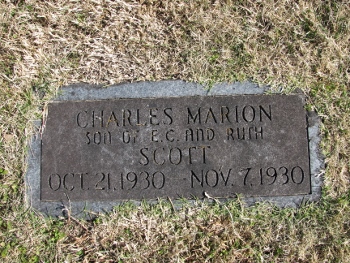
Charles Marion Scott’s gravestone; photo by Sue Henry
I hope I have an answer to that question: my own now-six-year-old son & all-around goofball, Finn (always called Finny by everyone in our family). He’s still too young to appreciate the family members that came before him, but I’m already telling him their names & why they are important. Ralph Granneman, his grandfather, a gentle sweetheart of a man. Edgar Scott, his great-grandfather, the repository of family lore. Ruth Scott, his great-grandmother, baker of cakes & worrier extraordinaire. Edgar Charles Scott, his great-great-grandfather, who ran off to join the Civil War on the side of the South until his mother sent his older brother to make him enlist on the side the family supported. Captain John Trigg, his great-great-great-great-great-great grandfather, commander of a battery of artillery at Yorktown under George Washington, and ratifier of the United States Constitution as a member of the Virginia House of Delegates. And Daniel Trigg, his great-grandfather nine times back, born in 1650 & resident “of Virginia”, the farthest back we can trace our roots.
Finny was born on December 5, 2008, at 12:38 in the morning. I was there the whole time, camera & smartphone in hand, recording his first moments. Here he is, less than 30 minutes after he introduced himself to us:
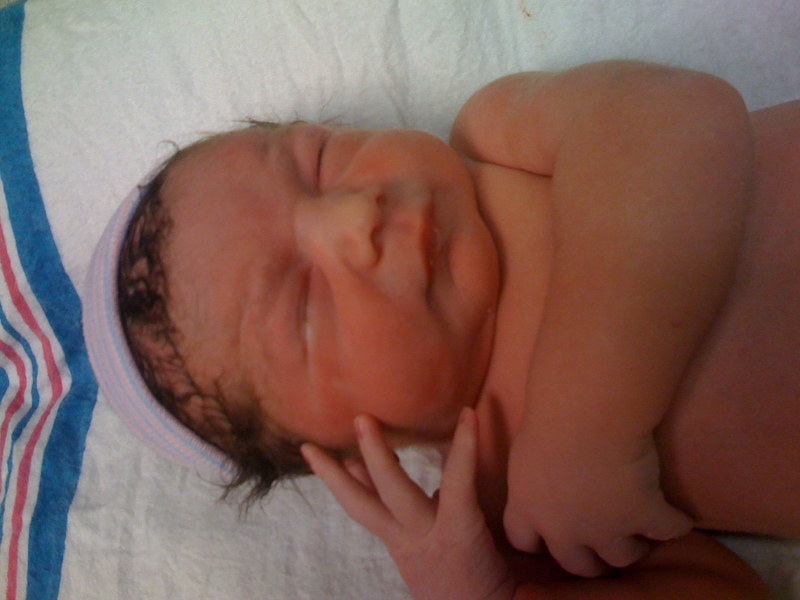
Finny’s first moments
His umbilical cord was knotted, as you can see here. I’ll never forget what the doctor said: “If this was any tighter, it could’ve been serious, but since he’s healthy, it’s just cool.”
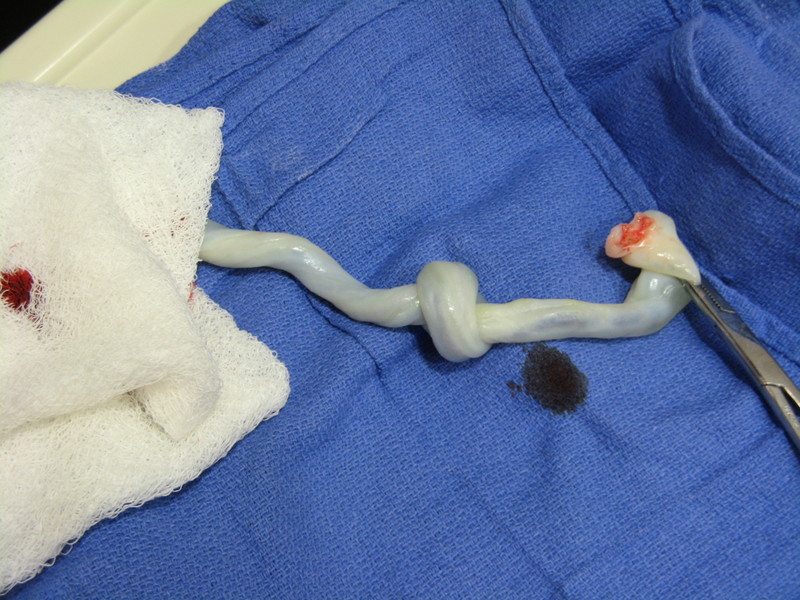
Finny’s knotted umbilical cord
And speaking of healthy, 8 pounds, 7 ounces!
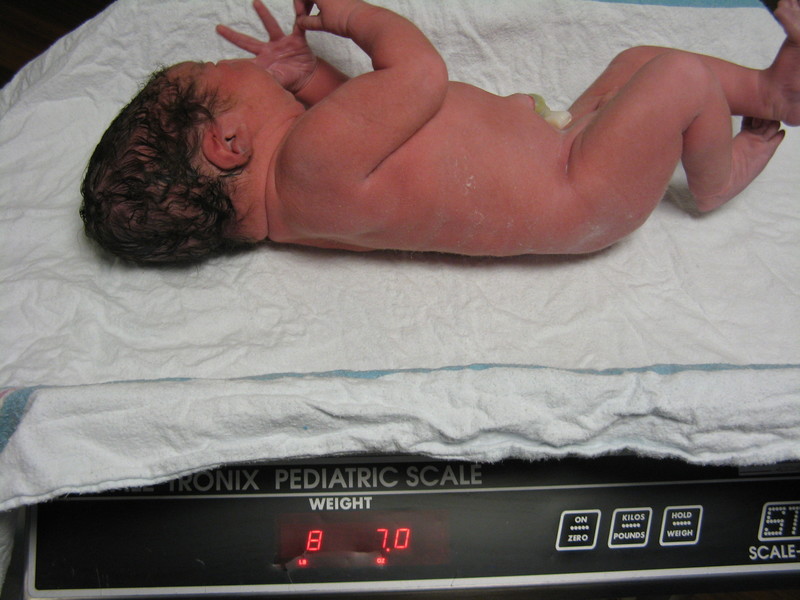
8 pounds, 7 ounces
Within the first two hours of Finny’s life, I had already taken 52 pictures. 24 hours later, I’d added 27 more. The next day, 30 more. The day after that, 10 more. Before the end of December, 201 more. Over 300 pictures of an infant that was just over three weeks old.
In the six years since then, I’ve taken thousands of pictures of that boy, and recorded hours of video & audio. I’ve written down milestones in his development & funny things he’s said on his own personal blog (ghostwritten by yours truly). I’m not alone. His mother has done the same, & so has his stepmother, his Uncle Gus, & his Aunt Sepi. Even my ex-wife, another “aunt”, has gotten in on the action & taken many photos & videos of my son. This is one well-recorded boy.
As I’ve gotten older, I’ve wondered about how I would have felt if my son had died at 17 days. Yes, this is morbid, but it’s a train of thought I’ve taken nonetheless. If Finny had died when he was 17 days old, my heart would have been ripped out of my body. But I would also have possessed hundreds of photos & videos of my little fella. Would they have provided comfort in any way? Or would they have been hundreds of little knives, each stabbing me & drawing more blood? I can’t say, & I’m glad that I can’t. But I also recognize that I had a luxury my grandparents never did: I had the easy ability to record my son’s life. And not just in still images, but with video as well, and as beautiful as photos are, video that shows how Finny actually moved & sounded & behaved, in all his uniqueness, is a greater treasure by far.
But I also recognize that I had a luxury my grandparents never did: I had the easy ability to record my son’s life.
Still, I have so many images & videos of Finny that I can’t possibly look at all of them. Of those I have, there are a select few that I treasure, but even then, we’re talking several dozen. In 100 years, what will Finny’s descendants want to see? Will they have the patience to work through the tens of thousands of images & videos of Finny that his parents & family will have generated by then? Or would it better to pass down just ten? Or five? Or two? Or one?
I think of my grandparents too, & wonder if they ever regretted the lack of mementos of Charles Marion’s short life. At most, given the time he was born, they could maybe have paid a photographer to take a single photo of their new baby. How much would they have treasured that single photo of baby Charles Marion after he died — & how much would I give now to have just a single image of my uncle, the man I would never know?
Abundance can be a wonderful thing, but sometimes just a single object, invested with all the meaning that broken hearts can grant it, is the most precious thing in the world.
— Scott Granneman, February 14, 2015
